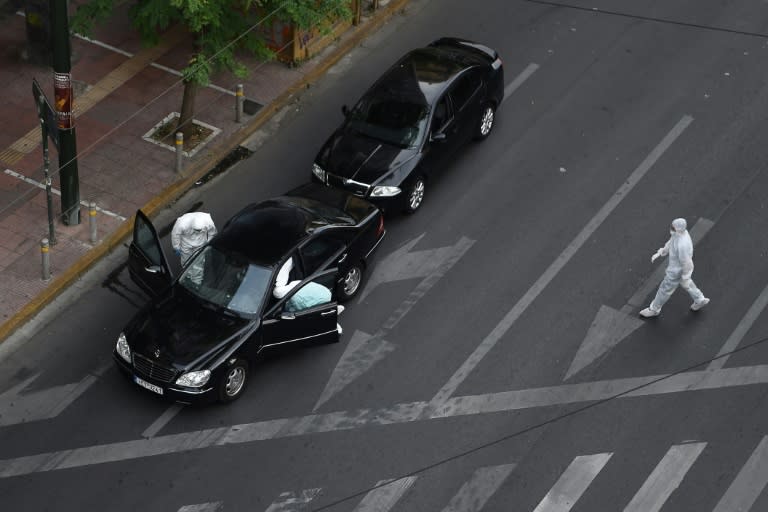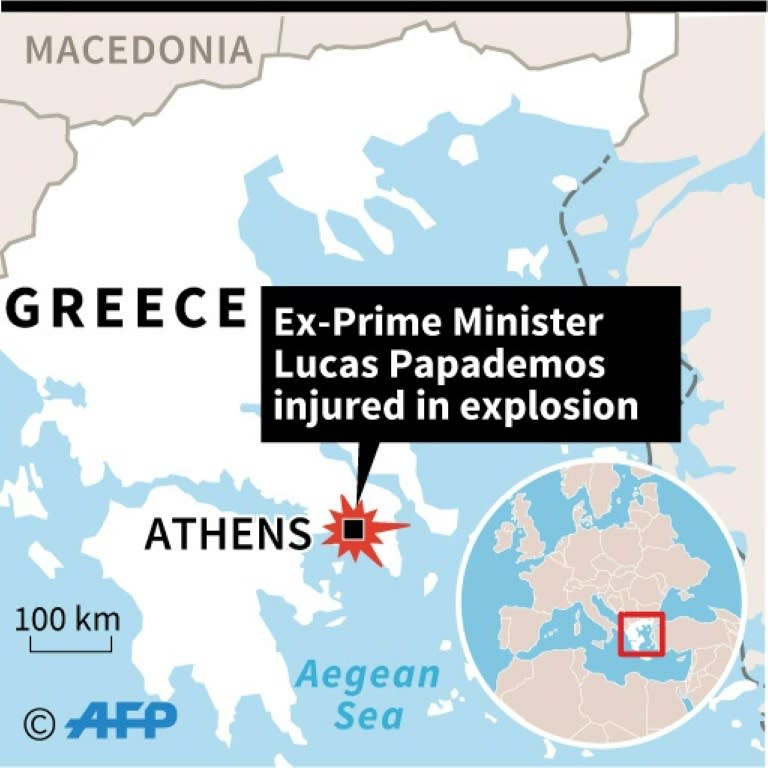Greek police probing security failures in attack on ex-PM
Greek police scrambled Friday to figure out how a letter bomb managed to wound former PM Lucas Papademos despite security checks being beefed up after a wave of similar attacks in March. "We want to determine whether security procedures were followed," a police source told AFP, hours after Papademos and two guards were injured Thursday by the bomb that exploded as they rode in an armoured car in Athens. "The fact that the attackers managed to get past security is worrying," the source said, adding that experts were trying to determine the nature of explosive used. Former PM Antonis Samaras, who spoke with Papademos in hospital, said the letter bomb had been delivered to his home after apparently undergoing screening. "He feels lucky because his hands were far away from his face" when he opened the letter, Samaras told reporters. Papademos sustained superficial injuries to the chest, abdomen and legs, Evangelismos Hospital in Athens said, after he apparently opened his mail whilst riding in the car. The 69-year-old economist was in stable condition but is expected to remain in intensive care for at least two days, doctors said. A later statement from Evangelismos Hospital said the former PM had undergone surgery to address a deeper thigh injury. One of his guards has trouble hearing, the hospital said. The police source said the attack was "largely symbolic" as Papademos was lightly hurt despite his proximity to the letter bomb. - No claim - Calls have already gone out to individuals who could be potential targets to boost security, and to the Greek postal service to step up searches for other similar devices. As a former PM, Papademos has round-the-clock police protection and his mail is screened by special machinery at the Bank of Greece and parliament. Leaders of all parties and former prime ministers condemned the attack, the first against an incumbent or former leader in decades. European Central Bank President Mario Draghi also expressed the executive board's "deep affection" for mild-mannered Papademos, who was ECB vice president from 2002 to 2010. Draghi called Papademos "a brave public servant of Greece and Europe." The methodology is similar to that used by Conspiracy of Fire Nuclei, a domestic far-left group which in March mailed a letter bomb that injured a secretary at the International Monetary Fund in Paris. The group had earlier claimed responsibility for an explosive device, also sent from Greece, discovered by the police at the offices of German Finance Minister Wolfgang Schaeuble. The bombs contained gunpowder used in firecrackers, police said. The police source acknowledged that Thursday's attack on Papademos was "similar" to those in March, but authorities do not want to rule out other possibilities. Papademos's name was on a target list compiled by Paula Roupa, a senior member of far-left group Revolutionary Struggle jailed in January. So far there has been no claim of responsibility. - Spotlight on 'Conspiracy' - If Conspiracy does confirm the attack, "it would be a problem," the police source said. "It would show that they have done their homework and are able to bypass security procedures," the source added. In 2011, several Conspiracy members, many of whom were very young, were convicted of "participating in a criminal organisation" and given long prison sentences. But three years later the group announced its return and has since committed sporadic attacks. Experts note that Greece's continued economic crisis favours youth radicalisation. "Socio-economic conditions favour recruitment" by extremist groups, the police source said. After seven years of crisis and austerity cuts, the Greek economy is still struggling. Unemployment is soaring -- especially among the young -- and wages and pensions have been drastically reduced by cuts and tax hikes. Papademos served as prime minister from November 2011 to May 2012 after the resignation of George Papandreou's socialist government, steering a batch of austerity measures through parliament to secure a multi-billion-euro EU-IMF bailout before stepping down for elections to be held. In 2012, Papademos's government negotiated a huge write-down of the country's privately held debt. The move was widely criticised at the time, as Greek social insurance funds lost millions of euros in the process. Papademos also drew fire for letting members of a far-right party join his coalition government. Papademos also served as Bank of Greece governor from 1994 to 2002. He is currently serving as chairman of the Athens Academy, the country's highest research establishment.




